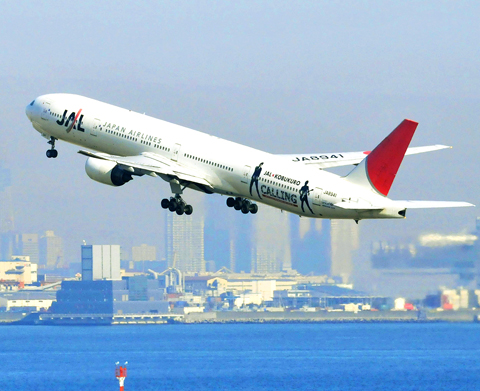Japan Airlines Corp (JAL) filed for bankruptcy protection yesterday, owing more than US$25 billion, and said it would slash 15,700 jobs and unprofitable routes as part of a plan to survive an industry beset by volatile fuel costs and fickle flyers.
JAL, Asia? largest airline by revenues, will remain in the skies thanks to almost ? trillion (US$11 billion) in support from a state-backed fund, but must go through a sweeping restructuring under a new board and management.
Shareholders will be wiped out and lenders will forgive a larger-than-expected ?30 billion in debt as part of the deal with the fund, the Enterprise Turnaround Initiative Corp of Japan (ETIC).

PHOTO: AFP
Bankruptcy will only be the beginning for an airline with depleted capital, facing headwinds such as rising fuel prices and shrinking passenger numbers, on top of hefty restructuring costs.
JAL, which has been bailed out by the Japanese government three times in the past 10 years, will replace many of its older, larger and less fuel-efficient planes.
It also faces tough decisions about foreign capital and alliances.
JAL? bankruptcy listing ?.3 trillion in total debts as of Sept. 30 ranks as Japan? fourth-largest ever.
Shares of JAL, which have fallen more than 90 percent since the start of the month, closed flat at ? after trading down ? to ?. They will be de-listed on Feb. 20, the stock exchange said.
With a market value of about US$150 million, JAL is now smaller than minor carriers Croatia Airlines and Jazeera Airways and is worth less than a Boeing 747.
? thought that there was no way that JAL would fail,?said Akiko Saito, a 63-year-old retiree returning from Sydney to Tokyo? Haneda Airport. ?ven when the value of my JAL shares fell from ?00,000 to below ?20,000, I was convinced that it would recover and I held on to my stock.

MORE VISITORS: The Tourism Administration said that it is seeing positive prospects in its efforts to expand the tourism market in North America and Europe Taiwan has been ranked as the cheapest place in the world to travel to this year, based on a list recommended by NerdWallet. The San Francisco-based personal finance company said that Taiwan topped the list of 16 nations it chose for budget travelers because US tourists do not need visas and travelers can easily have a good meal for less than US$10. A bus ride in Taipei costs just under US$0.50, while subway rides start at US$0.60, the firm said, adding that public transportation in Taiwan is easy to navigate. The firm also called Taiwan a “food lover’s paradise,” citing inexpensive breakfast stalls

TRADE: A mandatory declaration of origin for manufactured goods bound for the US is to take effect on May 7 to block China from exploiting Taiwan’s trade channels All products manufactured in Taiwan and exported to the US must include a signed declaration of origin starting on May 7, the Bureau of Foreign Trade announced yesterday. US President Donald Trump on April 2 imposed a 32 percent tariff on imports from Taiwan, but one week later announced a 90-day pause on its implementation. However, a universal 10 percent tariff was immediately applied to most imports from around the world. On April 12, the Trump administration further exempted computers, smartphones and semiconductors from the new tariffs. In response, President William Lai’s (賴清德) administration has introduced a series of countermeasures to support affected

CROSS-STRAIT: The vast majority of Taiwanese support maintaining the ‘status quo,’ while concern is rising about Beijing’s influence operations More than eight out of 10 Taiwanese reject Beijing’s “one country, two systems” framework for cross-strait relations, according to a survey released by the Mainland Affairs Council (MAC) on Thursday. The MAC’s latest quarterly survey found that 84.4 percent of respondents opposed Beijing’s “one country, two systems” formula for handling cross-strait relations — a figure consistent with past polling. Over the past three years, opposition to the framework has remained high, ranging from a low of 83.6 percent in April 2023 to a peak of 89.6 percent in April last year. In the most recent poll, 82.5 percent also rejected China’s

PLUGGING HOLES: The amendments would bring the legislation in line with systems found in other countries such as Japan and the US, Legislator Chen Kuan-ting said Democratic Progressive Party (DPP) Legislator Chen Kuan-ting (陳冠廷) has proposed amending national security legislation amid a spate of espionage cases. Potential gaps in security vetting procedures for personnel with access to sensitive information prompted him to propose the amendments, which would introduce changes to Article 14 of the Classified National Security Information Protection Act (國家機密保護法), Chen said yesterday. The proposal, which aims to enhance interagency vetting procedures and reduce the risk of classified information leaks, would establish a comprehensive security clearance system in Taiwan, he said. The amendment would require character and loyalty checks for civil servants and intelligence personnel prior to